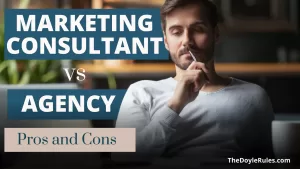How Not To Get Burned by your ad agency

Don’t let ad agencies take your money and run
We probably shouldn’t say this, but we have heard time and time again from businesses we’ve worked with about how they’ve been “burned” by agencies.
Clients are promised extraordinary growth. They’re led down the garden path in early conversations about their needs and goals, so they happily pay the expensive agency fees.
The eager clients then patiently wait for the magic beans they were promised to grow and flourish, only to inevitably succumb to utter disappointment.
This has very real consequences. The clients who are promised unrealistic expectations align their reality (which includes very real things like budgets and resources) with the silver bullet they’ve been sold.
When the client discovers that the actual results did not meet their grandiose expectations, they are left with the inescapable outcome of dismay. It’s the basic concept of expectation management.
Table of Contents
What it means to be burned
Agencies (marketing consultants and leaders not excluded) are eager to win clients to meet their revenue needs.
Turnover (client and employee) is typically quite high in the agency world as well as their outgoings, so obtaining new clients is critical for their success.
Sales teams are usually paid a commission based on client fees. Thus, they are financially incentivized to get the deal signed. The kicker is that salesperson is not the one who has to meet the expectations that have been set.
In other words, the salesperson is far removed from the discomfort of not meeting expectations.
Here’s how it usually happens:
-
Clients will first meet with a sales representative, then at a later meeting the client is introduced to an Account Director — someone of high experience and success.
The Account Director answers brass-tacks questions about channels, implementation, metrics, etc. Their job at this point is to dazzle you with their competency which, in turn, reassures your confidence in the salesperson.
The sales member and account director engage in enjoyable banter which further heightens your trust in the agency. This is because the Account Director is not questioning the expectations the salesperson has promised.
You’ll then be assigned an Account Manager – this person may or may not be a direct employee of the first Account Director you met with.
Often, the account manager will have less experience. Little by little the expectations the client initially had are not being met.
Agencies also use inflated titles for their employees to instill more confidence in their clients.
The client then will wait and see how their account performs. At recurring meetings, the client will be informed of win-after-win.
Losses will be glazed over. Look at this dazzling metric! Have you seen your CTR for this campaign? What about the CPCs for this campaign!? It will sound great; it will be reassuring.
Nonetheless, the client tinge of doubt in the pit of their stomach continues to grow. If everything is going so well, why are they not seeing the results in the overall numbers?
If this has happened to you, hopefully, you will find some comfort in knowing that you are not alone. It’s a tale as old as time and can happen to anyone.
In general, there are several ways that you can save yourself time, money, and heartache by ensuring that you don’t get wooed by snake oil salesmen. Further, you can make sure that the agency is transparent and helps you improve your business.
How to vet an ad agency
what to do before you hire an ad agency

8+ ways to cut through the bull$h!t and get the truth:
-
Be realistic
There is rarely a single silver bullet that will turn your business into a unicorn overnight. Success is earned and takes time. Aim for consistent and steady growth through quick feedback loops, gradual increases in sophistication, and an increase in initiatives over time. Hope for quick wins, but don’t rely on them.
-
Ask revealing questions about the performance of the agency
The sales member probably won’t know the answer, so ask for a written follow-up rather than an on-the-spot estimate.
-
Question or challenge the payment structure
Is it a win-win or negatively incentivized? Can they offer alternatives to the percentage of spend? Percentage of spend is by far the most common, and theoretically, this should encourage agencies to improve their performance, so you can give them larger budgets. But what we often see is agencies pressure clients into spending more and say the spending restrictions are the reason they can’t be successful (which may or may not be true depending on the specific situation).
-
Speak with the person who will be managing the account
It’s imperative that you trust them and that they understand your business goals.
-
Ask to see sample reports
Do they have dashboards that you can configure to what specifically you want to see (be sure to ask specific questions rather than accept generalizations)? Do they manually build reports for each call? Can they commit to showing the data how you want it for each meeting?
-
Do they have a hard-and-fast playbook?
Some agencies are white-glove and will tailor their campaign structure to your accounts’ specific needs (every single account is different, so this is very critical). Or do they have a magic formula that every client must follow? It’s easier for an agency to have a cookie-cutter structure which, to be fair, provides them with a lot of benefits and may work well for some accounts – but it’s not always in every client’s long-term interest.
-
Bring in an expert
If you have no clue what to ask or how to interpret answers, see if there’s someone in your network who can join the meeting with you (notice we didn’t say “on your behalf” if you’re meant to be the main contact you should still be on the call). Write down questions during the call to discuss with your resource afterward. Was the information they shared accurate or not? Let your resource jump in and ask questions, not just sit and listen.
-
Be a touch skeptical
Don’t trust everything they say. Expect that they’re exaggerating and convincing you through rose-colored glasses. If it still sounds decent and legitimate, move forward! If it sounds too good to be true and will cost an arm and a leg, maybe pursue someone else.
It’s not just the agencies, check yourself as well
However, it’s not all about the agency. Clients must also set realistic expectations.
- Set achievable goals
- Have ONE primary goal (profit, revenue, ROAS, spend, etc.)
- Be open to testing and failing
- Give the agency ample time to succeed
You must view the agency as a partner, not a remote extension.
- Share your learnings
- Be transparent with company performance
- Open communication lines between other functions to encourage omnichannel wins
- Ensure data tracks and the agency has access
- Maintain consistent messaging across the brand
- Voice your concerns, they’re not mindreaders
The Bottom Line
Despite the additional time and energy due diligence requires, it’s far and away worth the effort. It’s critical that you know exactly what you’re getting before you sign the contract.
How to keep an agency working in your interest
the best ways to maintain a successful relationship

12 ways to keep your ad agency relationship effective:
-
Set clear goals and expectations
Make sure you have a clear understanding of what you want to achieve with your advertising campaign and communicate that to the agency.
Time and time again clients want the holy trifecta of goals – a very specific amount of Revenue, Profit, and Spend (and thus also ROAS). This is fantastic to provide, and you should. However, it is NOT in any way realistic. You must be crystal clear about which goal matters most. And I hate to tell you this, but there can only be one.
-
Here’s how to decide the primary goal:
• Spend:
You have a very finite budget and it under no circumstances can be exceeded• Revenue:
You are comfortable losing money if you are earning revenue• Profit:
Budget can be flexible so long as you remain above a 1 ROAS (this includes underspending)• ROAS:
Spend can exceed the budget or revenue can shrink so long as a specific ROAS is achieved or exceeded.
This is slightly different from Profit as it likely factors in additional COGs and is a specific ROAS target
-
-
Have realistic timelines
Advertising campaigns take time to produce results, so be patient and don’t expect immediate results. There is a lot of upfront research required to deliver a winning strategy. Implementing a strategy is tedious and time-consuming. There will be kinks. Nothing will be flawless from the first iteration. It takes time to collect data, analyze what is and is not working, make optimizations, collect the data…
-
Standardize reports
Agencies love to cherry-pick the KPIs they share to paint an optimistic picture of success.
Don’t let them.
Always have the full funnel available – the agency can then highlight which KPI they want to focus the conversation on while the client still has access to the whole picture.
Be sure to have a comparative date range to baseline the data against so you better understand what the data means. We recommend also including the percent and numeric changes for quick reference (numeric changes for percentage rates are optional).
A standard funnel would be:
- • Impression Share (if email: sends)
- • Impressions (if email: opens)
- • Clicks (or site visits)
- • CTR (clicks / impressions)
- • Conversions (if multiple conversion types, they should be split out)
- • CVR (conversions / clicks)
- • Revenue
- • Spend
- • Profit (revenue – spend)
- • ROAS (revenue / spend)
- • AOV (revenue / conversions)
- • CPA (spend / conversions)
- • CPC (spend / clicks)
-
Get regular updates
You should have recurring meetings on the calendar.
As tempting as it may be, try not to cancel. If you must cancel, get an emailed version of the agenda and reports to review later as well as to have for your record.
Thoughtful and customized meetings with data will take 2-3 hours, on average, to prepare for. Be mindful of this regarding the cadence of meetings you schedule.
We recommend a video call once every 2 weeks. You could also consider alternating between a video call and an email update every fortnight.
Don’t be afraid to ask for updates on the progress of your campaign. It’s essential to stay informed and ensure things are on track.
-
Check platform change logs
This is controversial as it can be viewed as micromanagement.
But it is an incredibly easy way to see how much work is actually being done on your accounts and if the agency fees are worth it. An enabled campaign will naturally fluctuate so even if they’ve done no work there will still be changes to report on in your recurring meetings.
We’ve seen more than a few instances of agencies that regularly make 1, 2, or even 0 changes a month on their accounts.
This should be a major red flag.
-
Keep an internal change log
This can be an obnoxious request, but it will save you time and time again.
When a board asks specifically what happened April 2 years ago that caused performance to fluctuate rather than scrambling to guess you can simply reference your log.
Ideally, each function or the company has a centralized and standardized place to log changes (it’s better to have too much than too little in this instance, but you may want to define what warrants a log update).
Your agencies should be included in this. As your agencies and staffing fluctuate over time, having detailed records of what has happened will dramatically improve the natural deceleration turnover causes.
If your change log is within a Google Sheet (highly recommended over docs) make sure you own it, not the agency.
-
Don’t let the relationship fizzle out
Keep the lines of communication open and try to maintain a constructive working relationship with the agency. Therefore, recurring meetings and video calls are recommended.
You should participate in the updates, not just listen. Ask questions and share company updates.
-
Stay true to your brand
Don’t compromise your brand’s values or message for the sake of a campaign. This is particularly true when it comes to conversion rate optimization techniques.
Trust your gut.
-
Be open to feedback
Listen to the agency’s suggestions and be open to trying various things, but also be willing to speak up if you have concerns.
Customers don’t exist in the vacuum of one channel – they move fluidly across all functions. So, allow your agency to point out areas of opportunity they have identified even if it’s not in their scope.
-
Expect and demand failure
You cannot maintain success without testing. Iterations, optimizations, quick feedback loops – whatever you want to call them. They’re 100% necessary.
Testing is never a waste of time, and some tests will fail. That’s great. You learn from failures as much as you learn from wins.
Track your tests and be specific. Don’t be afraid to try new angles if it doesn’t work the first time.
Fearing failure will hinder success. Let your agency know that you expect them to fail and that you not only embrace it but want to hear about it.
-
Keep an eye on industry trends
Stay up to date on industry trends and use this knowledge to inform your advertising decisions.
The advertising space moves at an incredible pace and it’s easy to get left behind. Capabilities and initiatives both progress and transgress – it’s imperative to keep your finger on the pulse.
This is so you don’t leave money on the table or fall behind the curve.
-
Don’t be afraid to switch agencies
If things aren’t working out with your current agency, you can simply look for a new one. It’s not ideal, but neither is shelling out money for marginal benefit.
The
Bottom Line
Avoid getting burned by your ad agency

Partnering with an agency is not a hands-off experience
It’s imperative to view the relationship as a partnership, and probably most importantly – that you’re the boss. Making sure you, the client, and the agency is always on the same page is the key to a successful, long-term arrangement.
Although you can usually fire an agency with only 30 days’ notice, it’s incredibly disruptive and hinders success to continually be agency hopping.
Make sure you interview prospective agencies thoroughly before hiring them and expect that their promises are exaggerated.
When you’re working together remain engaged and attentive. Set up clear boundaries so that you maintain a comprehensive understanding of the work they’re doing, the amount of work they’re doing, and most importantly the results they’re achieving.

